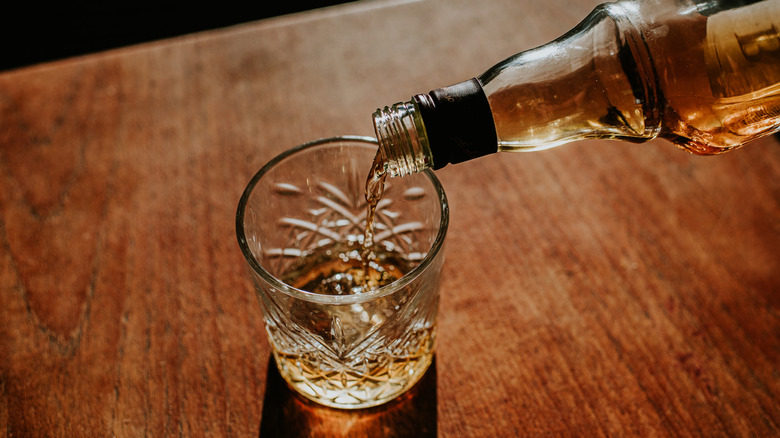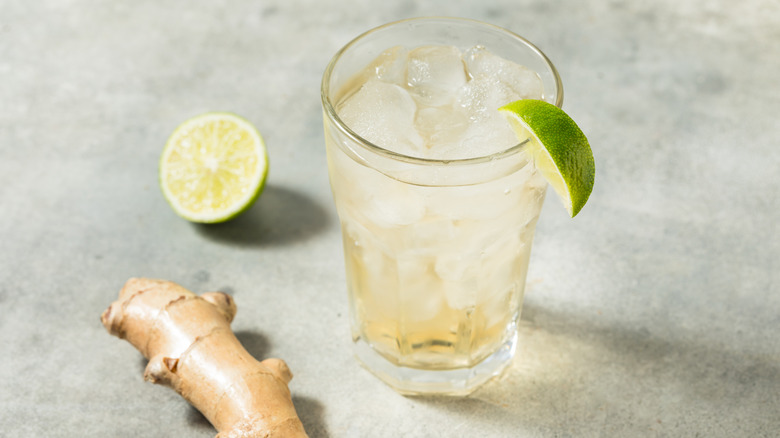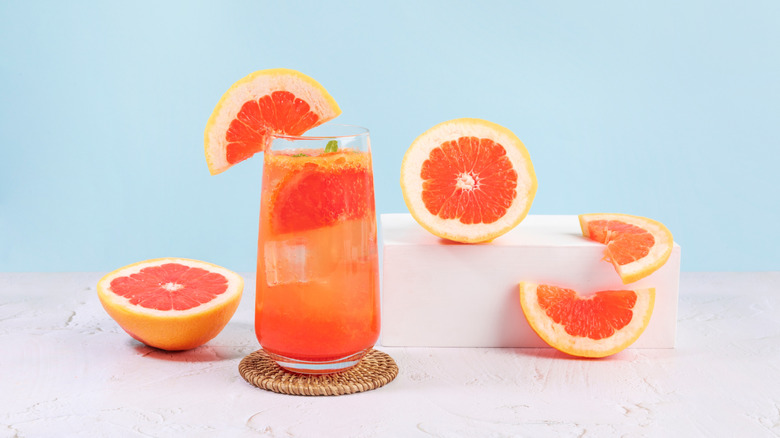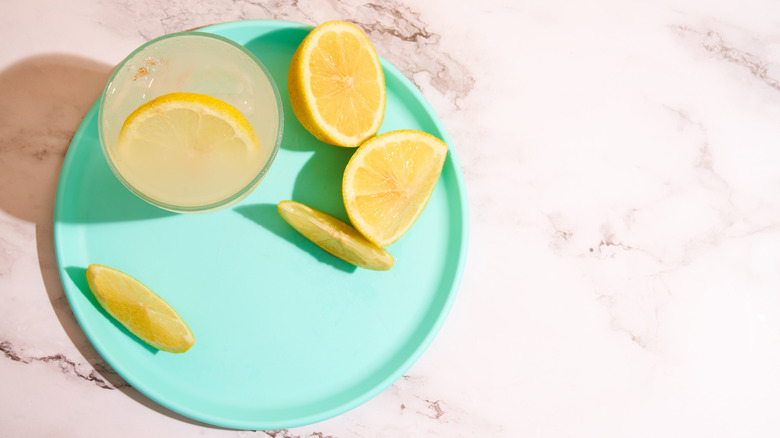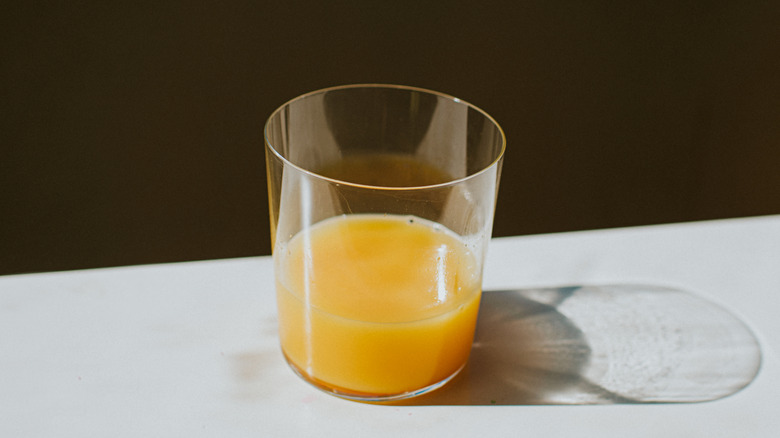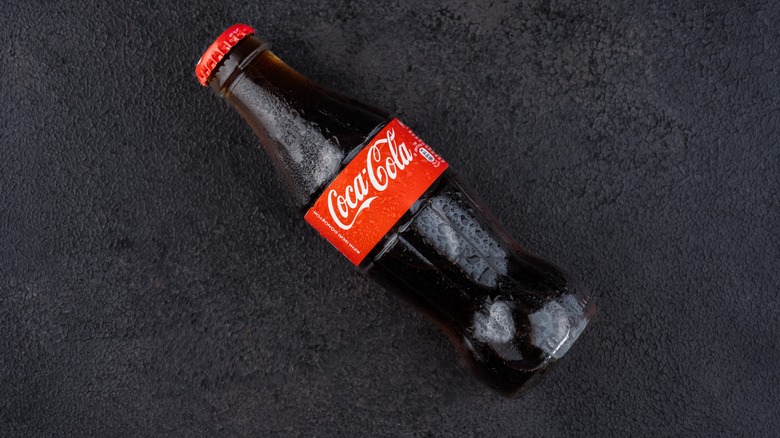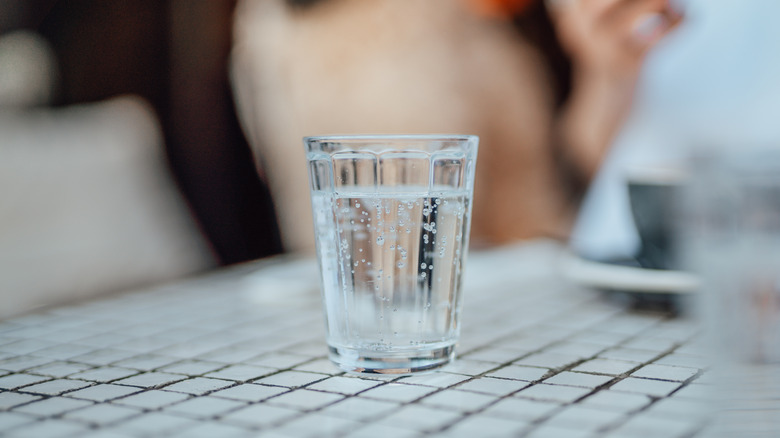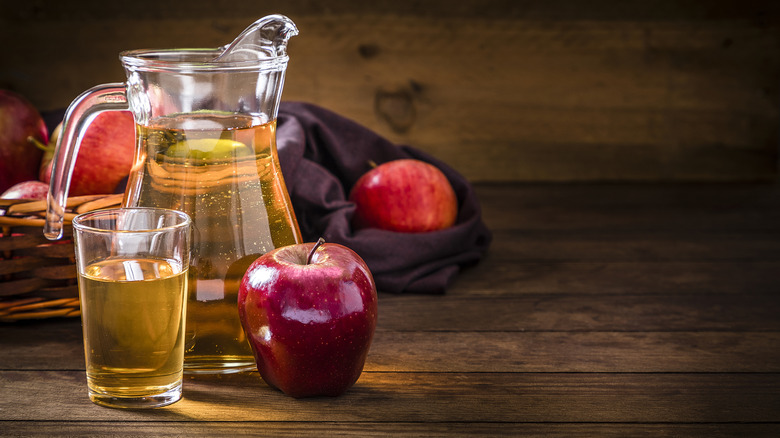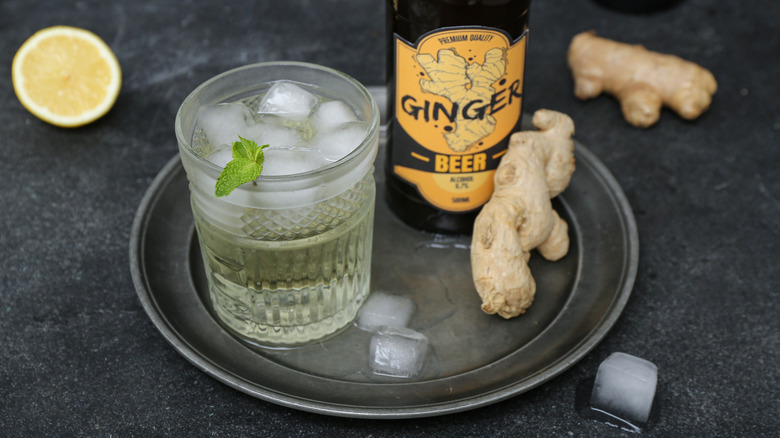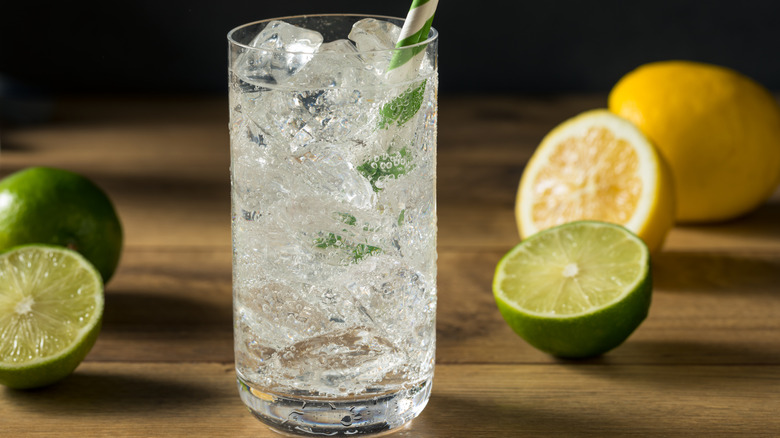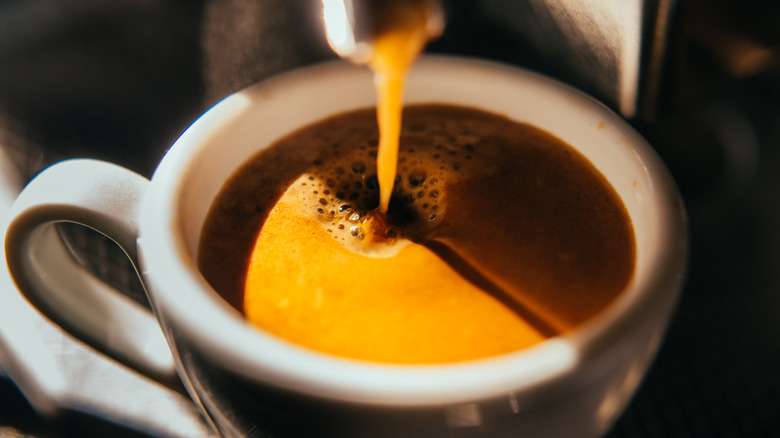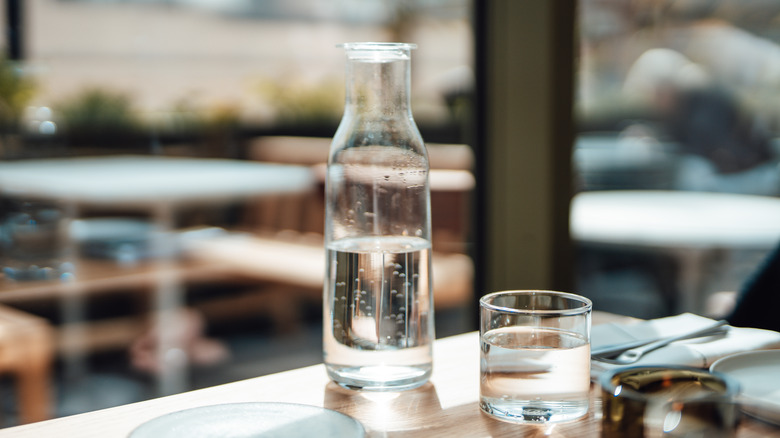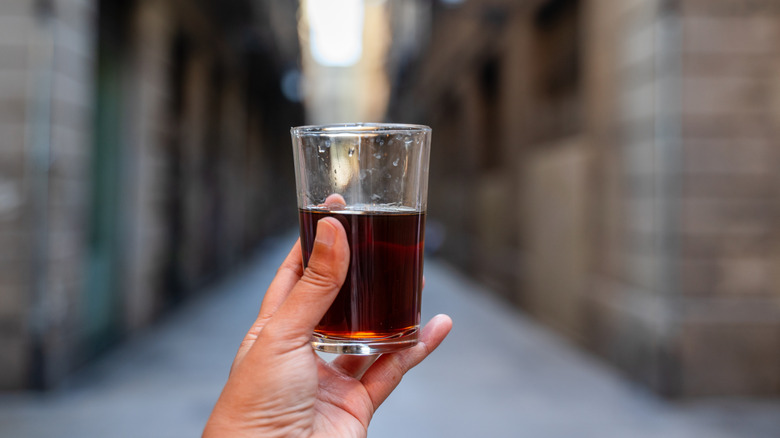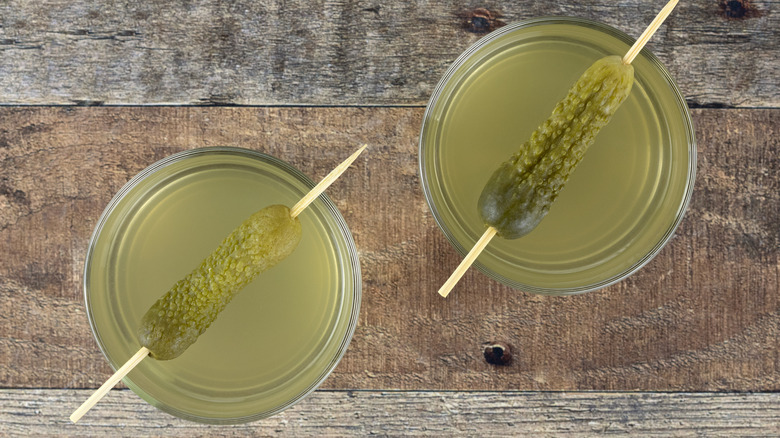Improve Your Cheap Whiskey With These Flavor Enhancing Mixers
The world of whiskey is large. With countless varieties — from scotch and bourbon to Irish or Tennessee whiskey — and plenty of amazing distilleries, whiskey has become a beloved liquor in nearly all corners of the globe. These passionate whiskey lovers have strong opinions on everything from the best type of whiskey to the top distilleries to the best whiskey mixers.
And while certain whiskeys deserve to be savored in their purest forms, not all whiskey is created equally. Top-shelf liquor may be delicious on its own, but the cheaper varieties sometimes need a little something extra to make them more palatable — and that's where the best whiskey mixers come in. We reached out to experts Chris Walster, whiskey connoisseur from The Cask Connoisseur, and Mark Littler, owner and editor In chief at The Whiskey Wash, to determine which mixers are the best to enhance the flavor of low-cost whiskeys to make them more palatable. Read on to discover our top picks.
Ginger ale
Ginger ale is the perfect complement to any whiskey — but especially those with a harsh taste you're looking to cover up. "Ginger and warm spices, such as cinnamon and clove, enhance whiskey's natural warmth," Mark Littler explains.
"[Ginger ale] complements everything from bourbon to blended Scotch," Chris Walster agrees. "You get the warmth of the whiskey and a refreshing fizz with just enough zing to make it interesting."
Craft ginger ale is usually made with cane sugar, fresh ginger root, and water, giving it the perfect balance of sweetness and spice. This flavor profile, paired with the fizziness from the carbonation, balances the boldness of most whiskeys. As an added bonus, the strong ginger flavor in most soda brands is powerful enough to cover up any burn you may otherwise experience from bottom-shelf liquors. Mix about three parts ginger ale to one part whiskey for the most balanced beverage. Serve over ice for a cold, refreshing drink that is the perfect blend of spicy and sweet.
Grapefruit juice
There are a lot of options when it comes to choosing a good mixer. "Basically, anything with strong flavor, decent sweetness, and a bit of acidity or fizz can do wonders for making cheap whiskey more palatable," Chris Walster says. One mixer with the perfect blend of these characteristics is grapefruit juice. Though more bitter than other citrus juices like lemon or orange, grapefruit juice beautifully balances sweet, sour, and tart for a juice that is in a class of its own.
This vibrant juice pairs perfectly with the bold flavors of whiskey, creating a tasty and balanced beverage — which is why this natural flavor pairing has been used in many classic cocktails like the Brown Derby (a mix of grapefruit juice, whiskey, and honey) or the bourbon paloma (bourbon mixed with grapefruit soda and bitters). As an added bonus, grapefruit juice is also nutrient-dense; it's filled with vitamins C and A and antioxidants and contains fiber, so you can start eating more grapefruit by mixing it with your favorite affordable whiskey.
Lemon juice and lemonade
Lemon is a nearly universal mixer that tastes delicious with a wide range of liquors, including whiskey. "Citrus fruits like lemon ... pair beautifully with whiskey, adding brightness and balance," Mark Littler says. That's why lemon is a favorite ingredient in classic cocktails like the whiskey sour — Chris Walster's favorite. "I'm a big fan of the whiskey sour," he explains. "It's simple but always hits the spot. That combo of citrusy brightness, mellow sweetness, and whiskey's depth is just chef's kiss."
If you prefer your libations a little sweeter, opt for lemonade instead of pure lemon juice. The sweetness takes the harsh edge off without overpowering the whiskey's natural flavors. You can also try flavored lemonades, like strawberry or pineapple, for even more sweetness and fruit flavor to cover up ultra-harsh taste of some whiskeys. Looking for another twist? Carbonated lemonade adds a touch of fizz that creates a perfect, refreshing drink for the warmer months.
Orange juice
Orange and whiskey flavors are a match made in heaven, which is why you'll find orange in many classic whiskey cocktails like a whiskey and orange juice with bitters or the Blood and Sand (which combines scotch, sweet vermouth, cherry liqueur, and orange juice). "Citrus fruits ... can bring brightness and acidity, which balances the richness and depth of whiskey," Chris Walster says.
Unlike lemon or grapefruit juice, orange juice is a unique citrus with a lot of sweetness and little bitterness or sourness. That is because oranges contain more natural sugar, creating a sweet, acidic flavor that beautifully complements the sweet, oaky taste of whiskey. If you opt to mix orange juice with your favorite affordable whiskey, be sure to use freshly squeezed juice for its brighter, tangier flavor. While the bottled stuff works in a pinch, it doesn't have as complex a flavor (because it's been pasteurized) and is less nutrient-dense than its fresh, zesty counterpart.
Cola
It's no surprise that cola is one of the top options for mixing with cheap whiskey, especially given the popularity of cocktails like the Jack and Coke. This combo is so popular, in fact, that Coca-Cola capitalized on it and created a pre-mixed version that's sold in a can to satisfy loyal fans.
The reason this pairing is so sought after? "Cola is a classic choice; it's sweet, fizzy, and rich enough to smooth out rough edges," Chris Walster says. Mark Littler agrees: "You can't beat good old Coca-Cola. It's always behind the bar, no matter where you are, and it does a brilliant job of smoothing out rough edges when you need it most."
And while Coke may be the default cola for most, there are other options available that are equally delicious, if not even more so. "Fentimans Curiosity Cola [steals] the show," Littler says. "Its deep, botanical flavors transform a simple mix into something far more complex and cocktail-like. If you want to upgrade a classic, Fentimans is the way to go."
Soda water
If you prefer a mixer that allows the flavor of the liquor to take center stage, soda water is the ideal option. "Soda water offers a more minimalist touch, ideal for those who want to let the whiskey shine with just a hint of dilution," Chris Walster explains, adding that sodas "balance the sweetness or effervescence of the whiskey's natural warmth."
Not only will soda water add pleasant fizz and dilute any unpleasantness of even the best cheap whiskeys, but it also helps to open up the liquor's flavor. This makes the drink smoother, more refreshing, and, to many, more enjoyable. When mixing your whiskey with soda water, "a good starting point for a whiskey and mixer is a 1:2 or 1:3 ratio," Mark Littler says. "It's enough to mellow the spirit without losing its character. Highballs like whiskey and soda often follow this guide, creating a refreshing, balanced drink. Stronger whiskeys might need a little more mixer; lighter whiskeys a little less."
Apple juice
Like other fruit juices, apple juice offers a sweetness and slight tartness that pairs wonderfully with the full-bodied flavor of whiskey. It helps that the high sugar content masks any harshness that often accompanies cheaper whiskeys. "Apple juice pairs beautifully with Jameson Irish whiskey, or you might like to try it with smoky or peated whiskeys, adding a refreshing fruitiness," Chris Walster explains.
Jameson Irish Whiskey has embraced this classic pairing, offering a recipe on its website for an apple juice and whiskey cocktail called The Cloudy Apple that mixes apple juice, lemon juice, simple syrup, an apple slice, and Jameson for a libation with the perfect sweet-and-savory mix. You can also experiment with mixing different flavored whiskeys (try our favorite flavored whiskeys that aren't gross). Cinnamon whiskey with apple juice, for example, creates a spicy, fall-inspired beverage perfect for autumn days spent apple picking or watching football. You can also swap out the apple juice for hard apple cider to create a beverage that's a bit higher in alcohol content.
Ginger beer
If you love bold, ginger flavor, ginger beer is the perfect whiskey mixer. "If you're not a fan of the whiskey you're using, then opting for a fizzy mixer would be the way forward, as this has the potential to overpower any harsh or overly sharp notes," Chris Walster says. "Ginger beer (not to be confused with ginger ale) is another strong contender, offering a spicy kick that can completely transform the whiskey's flavor."
While many may use ginger beer and ginger ale interchangeably, these two beverages are distinctly different. Ginger beer has a stronger ginger flavor and less sweetness, making it spicier and bolder than traditional ginger ale. It also contains alcohol and is slightly less carbonated for a milder, less intense fizz.
But like ginger ale and whiskey, the ginger beer and whiskey pairing works well because the two drinks beautifully balance one another. The sweet, smooth flavor of whiskey counters the ginger beer's zesty, warm flavor for a delicious, well-rounded concoction. You can even make homemade ginger beer to tweak the flavors to your exact preferences.
Lemon-lime soda
Though it may seem like an unlikely pairing, lemon-lime flavored soda mixed with whiskey is a crowd favorite. This drink combines many of the elements of cola and citrus juice — like the sweetness, acidity, and carbonation — to help cut through the sometimes harsh flavors of cheap whiskey and round out any roughness or burn from the alcohol.
Sodas like Sprite, 7UP, and Starry can be used to create this two-ingredient cocktail, called the Seven and Seven. Like a Jack and Coke, this drink is widely available at most bars and restaurants, making it a safe and popular option. You can also switch up your regular whiskey for flavored alternatives, like Jameson Orange, for an unexpected twist on this classic.
Though many sodas have a lemon-lime flavor, there is some variation among the most popular options. Experiment with different brands to find which you like best when mixed with your go-to cheap whiskey.
Coffee
Pairing coffee and whiskey may not be the most obvious choice to some, but the bold, bitter flavor of coffee is the perfect way to mask any harsh notes from cheap whiskeys. It also complements the sweetness and smoothness of the whiskey for added balance. "Chocolate or coffee can really enhance the whiskey's flavor profile and make it feel more indulgent," Chris Walster says.
For a more muted coffee flavor, use regular coffee. Or if you prefer a more intense, concentrated coffee flavor, opt instead for espresso. Both coffee varieties have similar bitter, rich flavors that offset the whiskey's tasting notes.
While you can mix just coffee and whiskey, you can include other accoutrements to this combination to create delicious cocktails. Add sugar and cream to make a classic Irish coffee. For a more spirit-forward approach, try mixing maple syrup and bitters with chilled coffee and whiskey to create a coffee-heavy twist on a classic old fashioned.
Ice or water
You probably already have one of the most affordable and most easily accessible whiskey mixers ready to go in your kitchen: water. Though often overlooked, plain old water is a go-to mixer for many to dilute the harshness of whiskey without altering the flavor in any way. It also opens up the whiskey and makes it possible to taste more of the nuanced flavors (which is why it's standard to add water during traditional whiskey tastings).
Like water, ice can also help mellow out harshness from lower-quality liquors. As the ice melts, it has the same effect as water — with the added bonus of also keeping your drink ultra cold. If you want your ice to melt more slowly, opt for a sphere shape that will last longer thanks to a smaller surface area. But for ultra-cheap whiskey, you may actually want the ice to melt a little faster, in which case you can opt for traditional ice cubes or smaller alternatives like pebbled ice. "Whatever you reach for, remember: when the whiskey's rough, more ice is always the answer," Mark Littler says.
Vermouth
"Fortified wines like vermouth add complexity in cocktails," Mark Littler says. This unique libation is infused with herbs and spices that give it a distinct flavor. The two main varieties — dry and sweet — can both be sipped straight, and because of their versatility, they can also be used in a variety of classic cocktails. Dry, white vermouth is commonly found in martinis, while sweet, red vermouth is usually found in manhattans and negronis (though there are other key differences between dry and sweet vermouth).
The floral, herbaceous flavors of both types of vermouth pair well with whiskey's oaky, sweet flavor — which is why this duo is found in many classic cocktails. You can mix either dry or sweet vermouth with any whiskey (even the cheap varieties) to create a balanced, well-rounded flavor. When mixing with a sweet vermouth, just be sure to opt for a whiskey with a high proof to help counterbalance the wine's ultra-sweet taste.
Pickle juice
If you've ever had a pickleback shot — a shot of whiskey followed by a pickle juice chaser — then you know that whiskey and pickle juice make a delicious, though unexpected, combination. But you also can mix the two to create a delightful concoction designed for sipping instead of shooting.
The briny, salty, and sour flavor of pickle juice offsets the full-bodied, rich taste of most whiskeys to create a brilliant balance (though it's just one of many ways to use up your leftover pickle juice). While whiskey would typically be paired with the brine of classic dill pickles (McClure's brand was used for the original pickleback shot), you can experiment with using the juice from other pickle types as well, such as bread and butter, half sour, or even spicy pickles. Just don't forget to strain the brine to filter out any additions like peppercorns, dill, or garlic.
And because pickle juice is packed with sodium, potassium, and magnesium, it is perfect to use for a bit of the hair of the dog. Drink the whiskey and pickle juice concoction straight, or make a brunch cocktail like a pickle whiskey sour or a twist on the traditional bloody mary.
